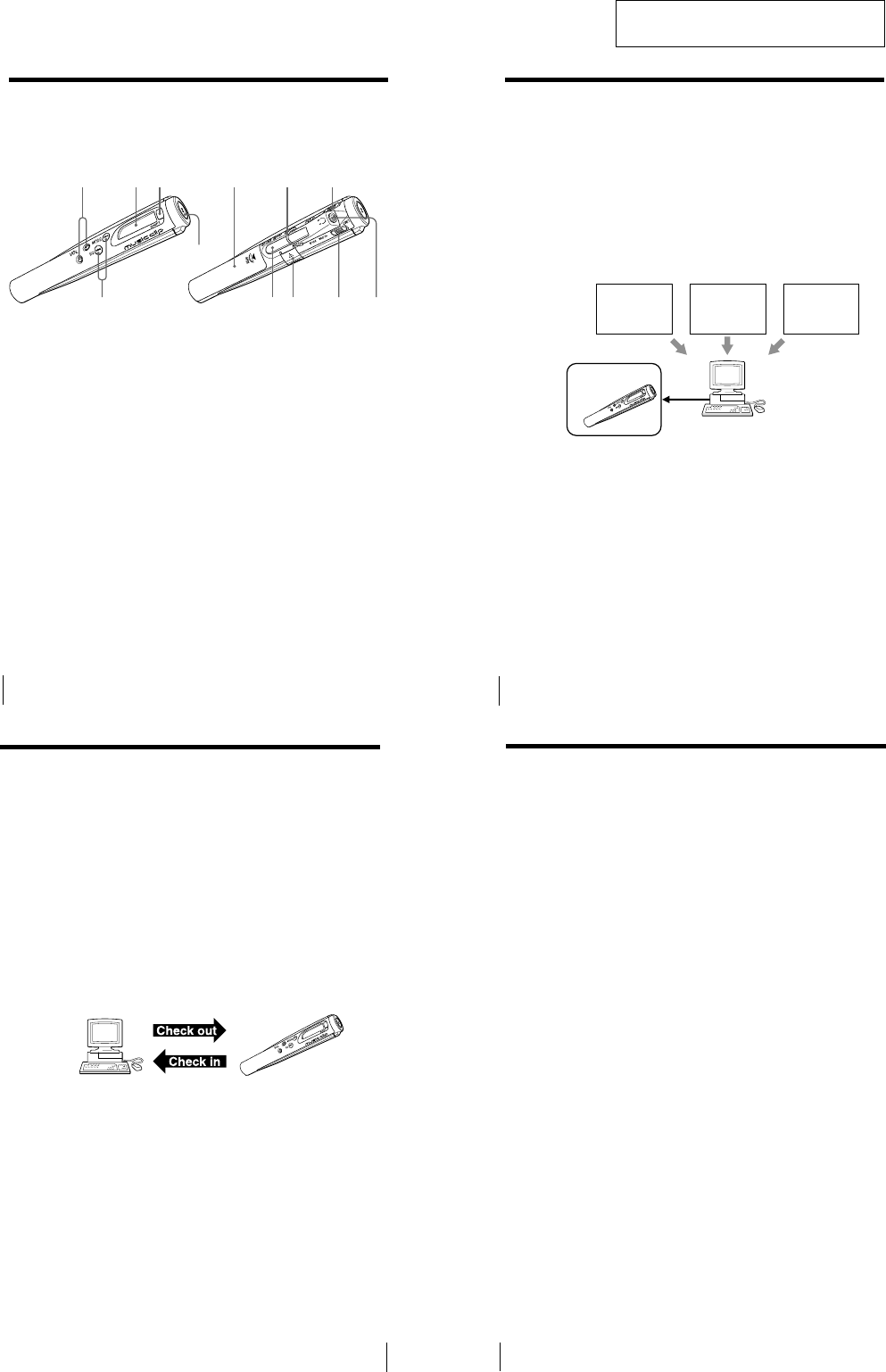
1-1
SECTION 1
GENERAL
This section is extracted from in-
struction manual (4-645-934-11).
10
1 VOL (volume) +/– (page 19)
2 Display (page 20)
3 SHIFT button (pages 21, 22)
4 N/x button (page 19)
5 ./> (EQ/MODE) buttons
(pages 19, 21, 22)
6 Battery compartment (page
13)
Parts and controls
7 Strap holder (page 14)
8 HOLD switch (page 23)
9 Headphones jack (page 19)
0 AVLS switch (page 23)
qa USB connector (page 15)
qs Clip
123
4
5
687
9q;qa
qs
Refer to the page numbers indicated in parentheses for details.
4
Overview
What you can do with your Music Clip Personal
Network Player
The Music Clip Player is a portable audio player that allows you to
easily transfer digital sound data from your computer to the Music Clip
Player.
The OpenMG technology* allows you to enjoy digital music, while
maintaining the copyrights of its holders.
The OpenMG-compliant application software that is supplied with
your Music Clip Player enables you to store digital music data on your
computer’s hard disk and transfer it to the Music Clip Player.
The supplied OpenMG Jukebox software enables you to import digital
sound data by:
– downloading sound data from Electronic Music Distribution (EMD)
services over digital networks such as the Internet,
– recording audio CDs onto the hard disk of your computer (the
recorded songs are encoded in ATRAC3 format),
– converting existing MP3 and WAV format audio files into OpenMG
format. (WAV format audio files are converted into ATRAC3 format,
and MP3 format audio files are converted into ATRAC3 format or
encoded without changing the format.)
The OpenMG Jukebox encrypts sound data in OpenMG format and
stores it on the hard disk of your computer to prevent unauthorized
distribution.
* Music Clip Player’s copyright protection technology conforms to the SDMI
(Secure Digital Music Initiative) specifications.
EMD services
WAV, MP3
files
Audio CDs
Music Clip
Player
USB
connection
Hard disk of your
computer (OpenMG
Jukebox)
6
System requirements
• IBM
PC/AT
and compatibles
CPU: MMX
Pentium
233 MHz and above (Pentium II 400 MHz and
above recommended)
Hard disk drive space: 20 MB and above (Free space is required,
depending on the version of Windows 98 and the size of the audio
data you are using.)
RAM: 64 MB and above
CD-ROM drive
Sound Board: Creative SoundBlaster 16 compatible
Default built-in USB port
• Operating system: The default installation of Windows
98 English
version (The product does not work on Windows 95/3.1 or Windows
NT. Not assured trouble-free if you use an upgrade version from
Windows 95/3.1 to Windows 98.)
• Display: SVGA (800 × 600 pixel) (supports High Color (16 bit) and
above)
• Internet access
Notes
• We do not assure trouble-free operation for all computers satisfying the
system requirements.
• If your computer has optical output, the music played back on OpenMG
Jukebox will not send digital data through that optical output.
5
Copyright protection
The Music Clip Player has some restrictions on recording and playback
to protect copyrights.
For details, see “Restrictions on copyright protection by OpenMG” on
page 30.
What is OpenMG?
OpenMG is a copyright protection technology used when recording
and playing back audio data on computers. OpenMG encrypts and
saves digital audio data on a computer’s hard disk, and allows the
audio data to be played back on that computer only, protecting it from
being distributed over a network without permission.
Transfer of sound data from your computer to the Music
Clip Player (Check in/Check out)
The supplied OpenMG Jukebox software enables you to transfer the
sound data stored on your computer’s hard disk to the Music Clip
Player (Check out) and transfer it from the Music Clip Player to your
computer (Check in).
Check in/Check out restrictions:
– You cannot check out the same song more than three times. (Certain
songs are excluded from this restriction.) However, if you transfer a
checked out song back to your computer (Check in), you can then check
out the song again.
– You cannot check in songs checked out to the Music Clip Player to
any computer other than the computer used for Check out.
For details, see “Glossary” on page 32.
Restrictions on sound data
Some sound data is distributed with restrictions on recording or
playback of the data to maintain copyright of its holders.
If the audio data has a limited playing period or playing count, you
cannot check it out to the Music Clip Player. You can play back the data
only with the supplied OpenMG Jukebox software.












